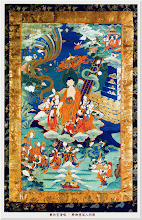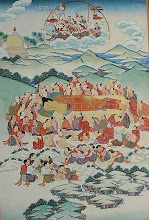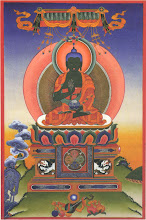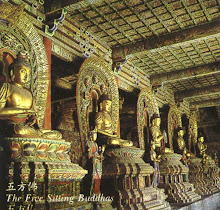Under the guidance of the Buddhist Yogi C. M. Chen
Written by Dr. Yutang Lin
The most popular practice adopted by Buddhists is the chanting of "Amitabha," the sacred name of the Buddha of the Western Pureland. Whenever I talk to people, I like to talk about the benefits of doing this practice. I talk from my own experiences and understanding of Buddha's teachings. Since many people know only a little about Buddhism, I present my ideas in simple words, with the sincere hope that the benefits will be shared by all who are prompted to do this practice.
Let me, first of all, talk from my own experiences:
In 1976, when I was a graduate student in the Group in Logic and the Methodology of Science at the University of California, Berkeley, I came across a Chinese Gong-fu novel Tian Long Ba Bu (i.e., the eight departments of gods, dragons, etc.) The author incorporates some Buddhist philosophy into his story. Driven by a Logician's fondness for accuracy, I wanted to verify his version of the Buddhist philosophy, hence I went to the East Asiatic Library on campus. Alas! There were thousands of books on Buddhism in the library, and I didn't know where to start. Back home in Taipei we had a copy of the Diamond Sutra on the altar, so I felt a kind of familiarity with it. Thus, I began my study on Buddhism by reading various annotations on this Sutra. The next three years I read quite a few books on Buddhism; gradually my interest shifted toward the study of classical Chan (Zen) stories (i.e., the Gong-An's of Chan masters.) Nevertheless, I gradually came to realize that reading by itself is not a reliable method. On the one hand, my interpretation of the same story would change from time to time, and I wouldn't know when I had the right one; on the other hand, even if my understanding of the philosophy were quite good, it was not readily applicable when I had to face the facts of life. The practice of chanting "Amitabha" is consistent with the profound philosophy of Buddhism. As long as I couldn't grasp the essence of Chan at once, I might just as well adopt this practice, the step-by-step path which is generally recommended for being safe and sound.
I worked rather hard on it; I tried to stick with it all the time. While chanting "Amitabha" I would even ignore visiting friends or relatives. Three months later I felt mentally and physically a bit more relaxed than before. During my first year of doing this practice, I chanted, on the average, ten thousand "Namo Amitabha Buddha" per day. Gradually I gained some supernatural experiences. At the time my accumulation had reached four million repetitions, I was very fortunate to have the opportunity to move on to the tantric path of Tibetan Buddhism. I voluntarily gave up my social activities so that I had more time for my practices. On the day after I received my Ph.D., I donated all my logic books to either the Math Library or the Logic Group's small library. I have been a full-time Buddhist practitioner ever since.
Although I'm now doing the more advanced tantric practices, I still adhere to my daily chanting of 1,000 repetitions of "Amitabha." Since our lives are impermanent, if I fail to realize the tantric goal of attaining Full Enlightenment within this body, I'll definitely need to reach out for the salving hand of Amitabha Buddha. Until today (12/09/92) I have accumulated 8,426,000 repetitions of "Amitabha." After each and every Dharma activity I always turn the merits to all sentient beings for their rebirth in Amitabha's Pureland.
Let me tell you one of my supernatural experiences:
Some people think that chanting Buddha's name is superstitious or self-hypnotic. In fact, the numerous records of Buddha's miraculous responses to faithful Buddhists' appeals are still well preserved today in the Buddhist literature. They certify that, although supernatural experiences are not common to people in general, Buddha's answer to our calls can be realized. However, there are still people who do not accept these records as evidential, and even consider these as mere propagandas. Thus I, serving as an eyewitness, would like to reveal my own story.
If I cited my dreams as examples, the critics would say: "You are so crazy about Buddha while you are awake; no wonder you dream of Buddha when you sleep. How could this be accepted as an example of supernatural experiences? It is nothing but your own imagination!" Therefore, the example I give below is not a dream; it happened when I was fully conscious and among a group of over 1,000 people.
The 16th Karmapa, the spiritual head of the Kagyu school of Tibetan Buddhism, came to San Francisco six years ago. My guru Yogi Chen led my wife, our son, and me to attend the Black Crown Ceremony bestowed by His Holiness. The origin of this ceremony is, briefly, as follows: the first Karmapa, Dusum Khyenpa, attained Buddhahood and manifested as the Buddha Chakrasamvara; simultaneously 100,000 dakinis (i.e., female Buddhas) gathered around and cheered him in celebration. Each and every one of them offered him one thread of her hair, and the hairs are woven into the Black Crown for him to wear.
Since then there have been 15 reincarnations of Karmapa, and they all wear this holy crown. However, this spiritual crown is not visible to the ordinary human eye; only those with great faith or high spiritual attainment may witness its presence. The fifth Karmapa, Deshin Shegpa, was invited by the Chinese emperor Yong Le of the Ming dynasty to go to Nan-jing. So he went to China and gave the emperor many tantric teachings. Once during a ceremony the emperor witnessed the presence of the spiritual Black Crown on his teacher's head, hence he ordered a replica made and offered it to Karmapa. Karmapa accepted the gift and agreed to the emperor's request that whoever sees this crown will receive the same blessings as seeing the spiritual one.
Thus began the tradition of Karmapa's Black Crown Ceremony, and each generation of Karmapa had conducted it over and over again to bless the faithful. Before the ceremony my guru taught me the mantra of Karmapa, and instructed me to recite it during the ceremony so as to become more receptive to the blessings. Guru Chen also explained to me that concurrent with the present Karmapa's wearing the crown, the first Karmapa would be spiritually present and we should stand up to express our respect.
The ceremony began with lamas reciting the ritual text and playing the ritual music, then His Holiness put the Black Crown upon His head. We stood up and I continued to recite the mantra in my heart. Right at that instant, when the Crown rested on His head, a strong force filled me. My blood circulation sped up and the force was so powerful that I shouted out the mantra in spite of myself. In the presence of so many people during a meditative ceremony, I knew quite well what my manners should have been. Nevertheless, such a force had never been experienced by me before, nor did I expect it. It simply came and took me over. Karmapa supported the Crown with His right hand, while reciting the mantra of Avalokitesvara and counting a crystal rosary with His left hand.
At the end of one round of the 108 beads, His Holiness took the Crown off. The force was with me all that time and the outburst of chanting from my mouth--to be more precise, from my heart--just kept going. Then, with the coming down of the Crown, the force left me, and my chanting quieted down. I was baptized by the Grace of Karmapa, the Dharma King. My experience, in Buddhist term, is called the sign of receiving initiations. In other words, I had, in fact, received the blessings. I was the only one there who did the shouting.
Afterwards I asked only my wife and our son to see if they also shared the same experience; they did not feel the force. It is not because Karmapa's blessings are partial to anyone, rather it's because I had accumulated over four million repetitions of "Amitabha," and that made me spiritually more receptive to the Grace of Karmapa. I hope that the above eyewitness account would help people understand that Buddhism is not just a philosophy, but also contains spiritual contents that could be experienced.
Living in this world, each one of us has more or less some worries. The universal problems of overpopulation on Earth, safety of the uses of nuclear energy, environmental pollution by industrial wastes, etc., plus the personal problems of health, career, social relations, family, etc., all weave into a web of sorrows. We would seem to be no better than the insects hanging on a spider's web. Aging, sickness and death arrive in no time, and we have no escape from them. Our lifelong efforts in the pursuit of wealth, fame, fun and pleasures will neither prevent the misfortunes nor prolong our lives.
Upon death all worldly efforts become futile, and the habit of worldly worries would render a peaceful departure impossible. Worldly things and worldly concerns take up the best of our time and energies, bring us numerous sorrows, and disturb us unceasingly up to our final moments. Were death the end of our consciousness, then the suffering would last but one lifetime. There are numerous records of reincarnations in the histories of mankind; how could we just ignore them as insufficient proof? Even today there are new evidential cases of reincarnation reported by researching scientists.
Buddhism teaches that our mentality at our final moments has the most influence on the outcome of our next rebirth. Shouldn't we reflect upon the goals and ways of our lives? Wouldn't it be better to go after a way of life guided by the wisdom of Buddha who is free from all sufferings? The teachings of Buddha are applicable, not only to our individual ways of life, but also to the direction and path for the human race. In a word, Buddha teaches us to "Forget yourself; Serve others!" A detailed and precise presentation of Buddha's teachings is beyond the scope of this talk, hence we go no further on this.
However, I would like to emphasize the fact that Buddhist practices can lead to the following:
1. The development of inner strength and tranquility that pacifies the storms of life.2. The increase of favorable circumstances and the reduction of misfortunes.3. The ability to give effective help to others through meditative prayers.
Above all, the most precious thing about Buddhism is its ultimate goal of achieving complete liberation from all suffering for all sentient beings.
There are Buddhist books collecting records of people who had obtained rebirth in the Pureland of Amitabha. Due to their diligent practice of chanting "Amitabha," many of them knew in advance the time of their departure from this life. Hence they could make their final arrangements in time, and bade friends and relatives adieu with grace, as if they were about to set out on a long journey. Moreover, their departures were often accompanied by miraculous phenomena, such as the coming of Amitabha Buddha with His holy attendants to welcome the dying person, supernatural lights, heavenly music coming from the sky, and/or extraneous fragrance, etc. In contrast, we ordinary people neither know when we'll have to leave, nor have any guaranty for a peaceful ending.
We may encounter an inopportune death, such as drowning, freezing, being shot, crushed or burned to death, or death due to diseases like cancer, heart attack or AIDS. After death we would go through endless transmigrations in the six realms--heaven, asura, human, animal, hungry ghost and hell--and endure countless repetitions of sufferings; while those who have gone to the Pureland of Amitabha Buddha are forever free from this vicious recycling of sorrows; we couldn't help but envy them. Fortunately Buddha's teachings are not patented by them; owing to the boundless compassion of Buddha, as long as we are willing to learn and practice the teachings diligently, we shall be at ease with life and death, and be liberated from all suffering.
Buddha gave various teachings to different people, always choosing the most appropriate one to suit the students' levels and needs. All the teachings from Buddha are sure paths leading to complete liberation, but which one is the best for ordinary people? The traditional choice is the practice of chanting "Amitabha." Even today it remains the most popular practice adopted by Buddhists all over the world.
From the Talk above we know that Buddhist philosophy is based on empirical spirituality and that Buddhist practices are indeed beneficial. Now I am going to explain the practice of chanting "Amitabha," using learning to swim as my favorite analogy. No matter how many books on swimming you have studied in great details, if you haven't tried it out in water, you won't be able to swim! Children who live by the ocean and play daily in the water learn to swim in no time, without reading any book on the subject. Most of them can even dive, surf and somersault in water; they are at ease and have a lot of fun! Of course, if they were to become experts, reading the right books would be helpful. But if their goal is simply to be able to swim, then reading becomes unnecessary. Likewise, studying Buddhist books is very important, but understanding the teachings without carrying out the practices will not float you through the tidal waves of life. Chanting "Amitabha," at the beginning, is like children wading; although with just a few tries a day, gradually they learn to float.
Numerous are the books on Buddhism; abstract and complicated are the terms and theories contained therein. One could hardly expect a thorough grasp of its essence in a short time. Furthermore, real understanding of the teachings can be gained only through the extraordinary experiences that come with the actual practices. The habit and experiences of chanting "Amitabha" will enable one to gain insights into Buddha's teachings. Moreover, the essential benefits of Buddhism would be tasted by the practitioners, and this is what really matters.
As modern men we generally have good common sense about diet and hygiene. We are selective and particular as to what to eat, how much to take, and how to combine and prepare the food. In contrast, we are generally quite careless about our consumption of spiritual foods. Willy-nilly we take in the commercials and gossips from television programs, newspapers or magazines. Upon reflection we would seem to be a spiritual dump filled up with all kinds of junk. This junk will not get us out of our sorrows; yet they are sure to incite our worldly desires or reinforce our prejudices.
Thus we become even tenser and more sorrowful. What a waste of life! If we build up the habit of chanting "Amitabha," it would be like drinking milk or fresh water, or eating nutritious food. A sorrowful mind is like a glass of muddy water; as the pure drops of "Amitabha" drip in continuously, at first the muddy water runs over, finally it becomes a cup of clear water--pure, clean and ready to serve. People who chant "Amitabha" not only benefit themselves. They will try to persuade others to do the same so as to share the same benefits. They will also help dying people by chanting "Amitabha" near the deathbed, or pray for people who are in trouble. In fact, the basic principle behind all Buddhist practices is to help all beings to achieve Buddhahood. Hence chanting "Amitabha" would transform one into, so to speak, a glass of fresh water that would quench others' thirst.
The holy name "Amitabha" can purify our minds, because Buddha transmits His blessings through it. Beginners could hardly sense this; old-timers may become aware of it. It is analogous to tuning in for a radio or television station. "Amitabha" is the particular frequency or channel that we want; our practice of chanting it, is an attempt to tune in. Beginners, with all sorts of worldly concerns in their minds, cannot concentrate on the chanting. Even while they are chanting "Amitabha" loud and clear, deep down inside there are still many thoughts running through, therefore, they are not tuning in to Buddha.
No wonder beginners cannot see Buddha's presence. Nevertheless, it is more a matter of sincerity and concentration than time, so it is also possible for a beginner to sense Buddha's grace, especially in the case of people who had done much practice in their previous lives. In general, however, we need to build up the habit of chanting "Amitabha," then gradually its strength will overcome our indulgence in worldly thoughts. Only then, with a pure mind, can we feel the transmission of power from Buddha. Like a 24-hour radio station, Buddha is transmitting His grace constantly; but we are unaware of it, simply because our minds are not tuning in.
Some advanced practitioners have witnessed the existence of Buddhas and Bodhisattvas in the dream state; the more advanced ones have seen the holy ones in meditation, which is a state of high concentration with ease. Some practitioners have even visited the Pureland of Amitabha Buddha either in dream or in meditation. These dreams differ from the ordinary ones in that the contents are orderly, symbolic and in agreement with the teachings; they can be recognized by experienced practitioners and be interpreted systematically.
Some of these dreams show concurrent distant events, foretell the future or impart teachings; they are indeed meditative states of a lesser degree. We should not discard them as mere dreams and confound them with the ordinary ones that reflect and extend our confusions, desires, and emotions.
When worry comes, it wouldn't be stopped: we would lose our appetite, forget our thirst, and sometimes even stay awake all night worrying. Suppose you say to yourself: "I won't think about this anymore!" Such a thought just shows that you are still tied up with it. So it seems that there would be no easy way to leave one's worries behind. Moreover, the things that vex us are various and abundant. On our backs we are carrying so many burdens picked up along the road of life--no wonder the years could have hunched our backs. Chanting "Amitabha" is a simple yet sure way out.
All worldly thoughts and emotions are intertwined. The whole complex could be activated by the slightest stirring of any limb, although we might not be sensitive enough to be aware of this. It is not unusual for trivial arguments to lead to big fights, or minor misbehavior to be taken as great offenses; all the tiny, insignificant annoyances in the past may be triggered by a careless remark into a volcanic eruption. The holy name "Amitabha" is transcendental and free from the whirlpool of sorrows. It is ideal to do this practice at the same time daily, for at least a certain number of repetitions. The fixed schedule would help us to form the habit of practicing daily. The preset minimum number of repetitions would make sure that our practice won't deteriorate. Ideally, one should gradually raise his minimum to a higher number, just as swimmers would gradually increase their number of laps.
Besides the daily practice, it would be helpful to chant "Amitabha" whenever possible, e.g., while driving, waiting, bathing, doing chores, etc., and even in dreams. One may chant "Namo Amitabha Buddha" (meaning homage to the Amitabha Buddha, and the name "Amitabha" means boundless light and infinite life), "Amitabha Buddha," or simply, but with equal reverence, "Amitabha." As time goes by, our hands will slowly be untied from holding the big bags of sorrows on our backs. Then one day, all of a sudden, the bags will be off our backs, because we have joined our hands with Amitabha's.
Jogging has been a popular exercise in recent years because it is simple, effective and beneficial. Nevertheless, it wouldn't be very useful, unless you did it regularly and persistently. Chanting "Amitabha" resembles jogging in that profound changes would ensue only after long-term practices. Chanting "Amitabha" is the spiritual jogging for our minds; it will increase our wisdom and endurance, and produce a healthy and mature mentality. Why don't we get into the habit of spiritual jogging? We may even unify the physical jogging with the mental one. Just add the chanting to your jogging by running to the beat of "Amitabha, Amitabha, Amitabha, ..."
The resulting concentration will improve the effectiveness of your jogging. Moreover, the mental jogging becomes a daily rush toward the spiritual summit of Enlightenment. Daily the repetitions would bring us a certain height upward. The spiritual strength which ensues would shelter us against the storms of life; the spiritual power that may be acquired by devotees could even render help to sentient beings in distress.
We would like to take care of our family members, especially aging parents and growing kids. Nevertheless, unless we ourselves are dependable and well-off, we could even become a millstone to the family. Who in the world has the guaranty that no accident will befall him? The habit of chanting "Amitabha" would invoke Buddha's mercy to protect us--afflictions would be eased and things would change for the better. One who constantly chants "Amitabha" keeps a pure mind; he would naturally do no harm, but good. Consequently he will be well-received by society, and live a stable and happy life.
Taking good care of our folks involves not only the provision of physical comforts and mental amusements, but it is also important to comply with their wishes and likings. But, most of all, we should endeavor to help them feel peaceful and calm when they are sick or dying. This is of course no easy job, but it is not impossible. The best thing to do is to convert the whole family into Buddhists; preferably all would gather together to do this chanting day by day. This will bring about a harmonic and peaceful atmosphere in the family. When someone in the family is sick or dying, remind him to chant "Amitabha" and the rest of the family would take turn in chanting along beside him. Under Buddha's blessings the one-mindedness of the whole family would relieve the suffering and conquer the distress. Best of all, the deceased would get rebirth in Amitabha's Pureland.
Even when the person needing help, be he a family member or not, has no experience of Buddhist practices, he may still receive Buddha's blessings through our chanting and praying for him. It is customary for Buddhists to pray for the joy and happiness of all sentient beings. I believe that our sincere concern for others' well-being should include easing their pains and sufferings, especially when they are sick or dying. Handing patients over to the hospital, leaving the funeral to the undertaker, and paying the bills are not good enough; we should strive for spiritual help that are direct and most significant to the sick or dying. These considerations are among the reasons that led me to give up worldly activities for Buddhist practices.
The practice of chanting "Amitabha" won't cost you a dime. Maintaining the holy name in your heart will keep your mind clear and pure. Isn't it better than indulging in self-centered wishful thoughts compounded with emotional entanglements? At least it would be more relaxing and effortless. I have savored the flavor of chanting "Amitabha," and I do pray that you will also have the same good fortune. Please realize your chance by trying it out. Good luck and best wishes!
July 27, 1986 Written during a retreat
Epilog
This article focused on the chanting of the holy name of Amitabha Buddha, but the ideas therein are not limited to this specific holy name only. For those who want to practice chanting, they may select other Buddhist holy names or mantras according to personal inclinations, for example, Namo Healing Buddha, Namo Avalokitesvara (Guan Yin) Bodhisattva, Namo Ksitigarbha (Di Zang) Bodhisattva, Om Mani Peme Hung, etc. The key point is to engage oneself deeply into one practice, i.e., to base one's chanting practice mainly on one specific holy name or mantra and practice it frequently. For other holy names and mantras besides the main one, one may chant a few repetitions during regular morning or evening sessions or at some other time. The wisdom and compassion of all Buddhas and Bodhisattvas are based on Non-Self, and they are indivisible in Limitless-Oneness. Therefore, one may choose any one of their names or mantras for practice.
This supplementary explanation is added in response to Ms. Yun-hua Huang's request.
April 9, 1998A study for the cultivation of harmony, California
Tuesday, April 22, 2008
Subscribe to:
Post Comments (Atom)


























.jpg)















No comments:
Post a Comment